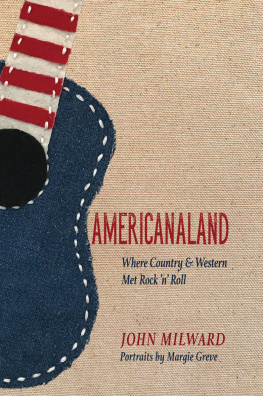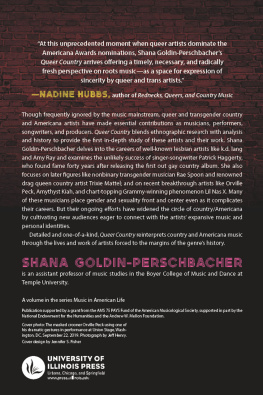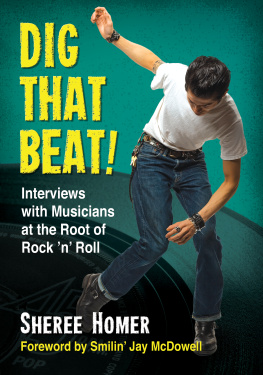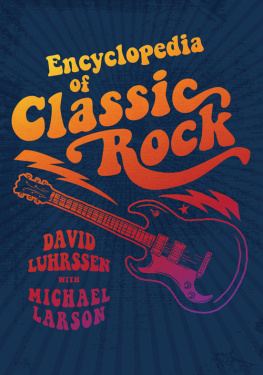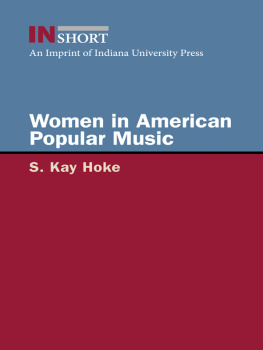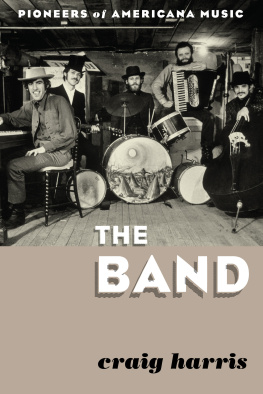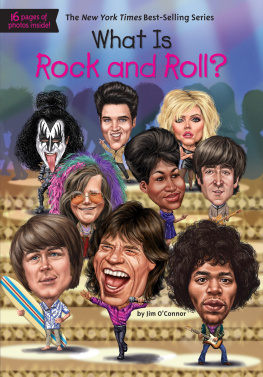AMERICANALAND
MUSIC IN AMERICAN LIFE
A list of books in the series appears at the end of this book.
2021 by the Board of Trustees
of the University of Illinois
All rights reserved
Library of Congress Control Number: 2021936455
ISBN 978-0-252-04391-8 (cloth)
ISBN 978-0-252-05281-1 (e-book)
CONTENTS
ILLUSTRATIONS
AMERICANALAND
INTRODUCTION
Americanaland
Americana is a genre of music that presumes to include country & western, rock n roll, folk, blues, soul, and bluegrass (among other things). Americana is hard to define, but easier to recognize. In the 1990s bands such as Wilco and the Jayhawks and such singer-songwriters as Steve Earle and Lucinda Williams combined elements of rock and country and were said to be playing alt-country. Thats when Jon Grimson, a record promoter, and Rob Bleetstein of the Gavin Report radio tip sheet created a chart to monitor airplay for such records.
I originally wanted to call it the Crucial Country chart, said Bleetstein, but [Bill] Gavin thought it was too big a slight on mainstream country. Then Grimson came up with Americana. That one stuck with me after I thought about what it meant musically, said Bleetstein, which was really nothing, so it was our chance to define it as something. The Americana chart only lasted a few years, but the term stuck around. The genre is now more than twenty years old, with its own trade organization (the Americana Music Association was founded in 1999) and Grammy Award category (since 2009).
This is how the Americana Music Association defines Americana: Contemporary music that incorporates elements of various American roots music styles, including country, roots-rock, folk, bluegrass, R&B, and blues, resulting in a distinctive roots-oriented sound that lives in a world apart from the pure forms of the genres upon which it may draw. While acoustic instruments are often present and vital, Americana also uses a full electric band. Both broad and vague, the term became a useful handle for roots-oriented musicians. Ive been bleeding outside the lines for some time, said Emmylou Harris, who was a country star before she became the queen of Americana. I like to think I have my own category by now. In recent years, Harris has won Grammy Awards for both Americana and Contemporary Folk.
But Americana was happening long before it had a name. Think of string bands, blues singers, folk musicians, and jazz players passing songs and instrumental techniques from one generation to the next. The modern history begins with the 1927 recordings of Jimmie Rodgers and the Carter Family. Then Hank Williams twisted a yodel into 1949s Lovesick Blues, and Elvis Presley paired an Arthur Crudup blues (Thats All Right) with a Bill Monroe bluegrass song (Blue Moon of Kentucky) for his 1954 debut. Ten years later, the Beatles cut country songs by Buck Owens and Carl Perkins and brought those influences into their own tunes. The Byrds, inspired by Bob Dylan and the Beatles, pioneered folk rock and, a few years later, country rock. Dylan turned heads when he went to Nashville to record 1966s Blonde on Blonde (and later, John Wesley Harding and Nashville Skyline) with the citys best musicians. Willie Nelson left Music City to become a Texas outlaw who appealed to fans of both country and rock. Guy Clark and Townes Van Zandt went from Texas to Nashville and nurtured a songwriting circle that included Steve Earle and Rodney Crowell. All this inspired recent generations of musicians to make music at the corner of country and rock. Thats Americana.
Elvis, to choose one, was far too popular to be considered Americana, which in the contemporary music scene is a niche genre in an era in which rock n roll is itself a minority taste. Chris Stapleton got his start writing hits for mainstream acts such as Kenny Chesney and sang and played guitar with the Steeldrivers, a bluegrass band. Stapletons 2015 solo debut, Traveller, has the musical characteristics of Americana, but when it sold more than three million copies, he became a country star. Similarly, Kasey Musgraves found commercial and Grammy success despite being too pop for country and too modish for Americana. Both artists make music that is likely to appeal to fans of Americana but already play to a broader audience. Conversely, Sturgill Simpson and Mumford and Sons are mainstream acts that got started in Americana. Plenty of others stuck around. You dont get limos and Lear jets, says roots rocker Dave Alvin of a career in the more intimate world of Americana, but you can have a long career. Thats not a bad trade-off.

JIMMIE RODGERS
In September of 2017 I went to Nashville for Americanafest, an annual event that attracts thousands of fans, musicians, and industry professionals. Promoted by the Americana Music Association, the multi-day affair features daytime panels about various aspects of the music and business, promotional parties for press and record-business insiders, and long nights watching performers play at clubs all over town. The centerpiece of the event is the Honors and Awards ceremony held at the so-called Mother Church of country music, Ryman Auditorium, and recorded for later broadcast on Austin City Limits.
Jim Lauderdale, wearing an embroidered Nudie-inspired suit, was the nights emcee. Lauderdale is Americana to the core. Hes written hits for country stars such as George Strait, collaborated with Grateful Dead lyricist Robert Hunter, and released more than thirty albums in a variety of styles, including a pair of bluegrass albums recorded with Ralph Stanley. The house band was to be led by guitarist Buddy Miller, who is Lauderdales partner in The Buddy and Jim Show on SiriusXM. But because Miller was under the weather, guitarist Larry Campbell stepped up to lead the ensemble. Campbell had played with the Buddy Miller Band in 1980 in New York, where they ran in the same pre-Americana, urban-country circle as did Lauderdale. Now theyre all elder statesmen of the genre.
The show opened with Old Crow Medicine Show emerging from the audience while playing Rainy Day Woman #12 & 35 from their live album celebrating the fiftieth anniversary of a landmark Americana album, Dylans Blonde on Blonde. John Prine, another songwriter whos helped shape the genre, performed his wry country song In Spite of Ourselves with the nights winner of the Trailblazer award, Iris DeMent. Drive-By Truckers showed why some call Americana country music for Democrats by performing a song about racially motivated shootings, What It Means, but lost the Band of the Year award to Marty Stuart and His Fabulous Superlatives, who play country music with the intensity of a rock n roll band. Jason Isbell, among the most successful of Americana artists, performed If We Were Vampires with his wife Amanda Shires, a singer-songwriter and violinist who won the Best New Artist award. All of these artists live within the pages of Americanaland.
Old World rock stars were also on the program, with Irelands Van Morrison given a Lifetime Achievement award, and the U.K.s Graham Nash given the Spirit of Americana/Free Speech in Music award. Nash sang So Sad, an Everly Brothers song, with the Milk Carton Kids, a duo that evokes the tradition of singing siblings. These famous musicians have also been honored at the UK Americana Awards, and Australia holds its own Americana Music Honours. These events draw Americana fans and performers looking to court them. At the end of the Americana Awards show, the players gathered to pay tribute to country singer Don Williams, who had just died, with a communal sing-along of his Tulsa Time.

